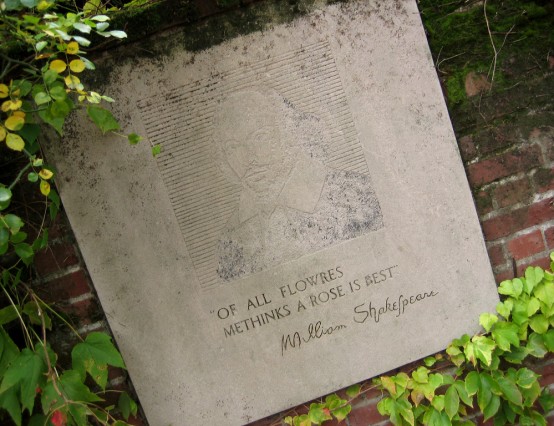As the next generation of whining schoolchildren awaken and with their satchels and shining morning face eagerly walk into an English classroom of fun-filled learning, you can hear the enthused groans as they stare down their worn copies of 'Macbeth' or 'Romeo and Juliet'. As they diligently studying each and every undecipherable word, twice, before glancing at the footnotes only to sustain a puzzled expression. No wonder they go 'creep[ing] like snails unwillingly to school' for the next two years of compulsory GCSE study. After all, this is 2016 and using 'thou' and 'thine' is not tweet-worthy. Back in 1929, Sapir and Whorf prescribed 'Linguistic Reflectionism,' the idea that language reflects thought. So, if you think the Bard is outdated in today's society, think again.
In his time, Shaky could verb a noun, noun a verb and substitute one part of speech for whatever else he fancied. This trick of the trade is 'conversion' for the inner linguist within you. Conversion is the process of a word of one word class being used as part of another word class. But what does this mean in human terms? Well, he was able to manipulate language to convey emotions 'unparalleled in English' previously. Meaning the Bard was able to show emotions to audiences in specific ways never shown before. Just like how we do with Instagram and Twitter today.
Esteemed director, Trevor Nunn, who has worked at the National Theatre and Royal Shakespeare Company, has said of Shaky's works: 'in the plays, there is an understanding of the human condition that doesn't exist in religious books.' As Nunn has directed 30 out of 37 of the Bard's catalogue of plays, there may some bias in his words. 'Shakespeare is my religion,' he enthusiastically chants in an uncanny, stagey, theatrical way. However, there must be a reason why one would dedicate one's career to some playwright, whose work historians can still barely pin point.
As thou would say what's in his syntactic structures that which we would call a rose by anything as praiseworthy? Yes, Shaky was able to amaze his audiences with blazing blank verses, preened poetic structures and groovy grammar. So, although we don't churn out our words in the steady de-dum de-dum rhythm of iambic pentameter from Midsummer to Winter, we're still subconsciously Barding away. Although you could argue that we don't recite long soliloquies like Iago or Edmund might have to address their 'friends', Shakespeare contributed over nearly 10,000 words to the English language.

- Shakespeare's Globe Theatre - not just anyone gets a theatre associated with them (Flickr/XiaoZhuli).
You don't need to be a trained Shakespearean star to know them. If you've ever been 'in a pickle,' or gone on a 'wild goose chase,' or have ever had a 'gossip,' you've been quoting from 'The Tempest', 'Romeo and Juliet' and 'A Midsummer Night's Dream,' respectively. Congratulations. Despite not talking to authority in poetic verse and commoners in prose you're well on your way to booking yourself an audition for the RSC.
All this granted, Shaky's influence in his day probably wasn't all that it is today. Way back when, the 1604 King James Bible was actually the most widely read text. Falling behind, our Shaky's plays were second. Meaning everyone spoke bible, wrote bible and lived bible. Literally. Not everyone wrote Shakespeare and spoke Shakespeare. Purely because they only heard Shakespeare and maybe understood Shakespeare. By adding brand spanking new words to the language back then, not everyone could get the gist of what Helena was yelling to Hermia.
Not much has changed really. King James 'swaggered' on and made English the official language of state. For a country that had been greatly influenced by the rich, indulgent Latin lexicon from the Inkhorn controversy (such as 'superiority', 'encyclopaedia' and 'disagree'), this caused 'midsummer madness' for them. But, there was a 'method' in this 'madness'. The result? Standardisation and a divergence from the handful of random dialects that made up 'English'. Just think of the crazy 'rude mechanicals' in that play we've all giggled at and think of their funny dialects. That was English.
We must not forget the incredulous, extraordinary characters who churned out these words of wonder. As the portals to new worlds, these stars were profoundly human in their strengths and struggles, which famously led to Shaky being more adapted than his fellow 'green-eyed' competitors; Edward Spenser, John Milton and Christopher Marlowe. He could afford to 'Shake[speare] it off'…when was the last time you saw four different BBC adaptations of Marlowe's 'Tamburlaine?'
Well, the fact that students are more likely to be taught Shakespeare (and impressively show off their ability to quote 'Oh Romeo, Romeo, wherefore art thou…' with ease) suggests he clearly deserves a place on the curriculum for the future generations to understand. Or try to understand. His staying power on the curriculum rests in his inaccessible nature. After all, any genius can decipher 'the moving image', 'media studies' or 'information reading'. But, can everyone decipher Shakespeare without being 'trumpet tongued' as Macbeth would say?
Either way, all's well that ends well. You don't get called 'The Bard' for no reason.
- Header image courtesy of Flickr/MoonieRocks










I love how you address the Bard as "Shaky". I have this image in my head of Shakespeare just randomly shaking on the spot...